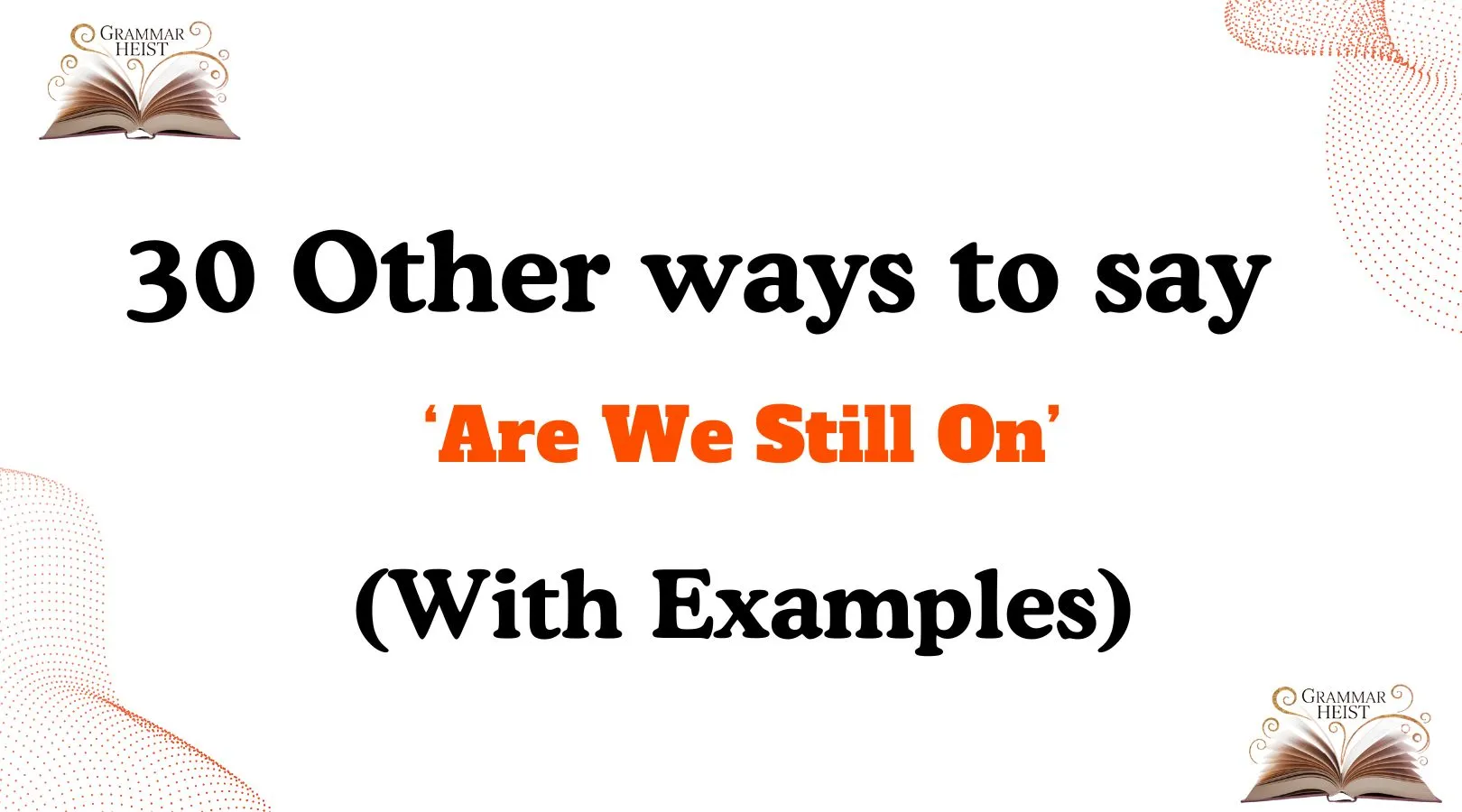Finding the right words to express ourselves is key in maintaining positive communication with others. Whether in professional or personal settings, the tone and phrasing we choose can make all the difference. Asking, “Are we still on?” is often necessary but can sometimes come across as too blunt or lack warmth.
By exploring different alternatives, you can convey care, warmth, and thoughtful attention to detail in your messages. Below are 30 other ways to say “Are we still on,” each with examples to help you communicate with empathy and care.
Is It Professional/Polite to Say “Are We Still On”?
While saying “Are we still on?” is generally accepted in informal conversations, there are more polished and considerate ways to inquire in professional settings. It can sound abrupt, and you may want to soften your approach depending on the situation. In a professional context, opting for a more refined phrasing helps maintain professionalism while still getting your message across.
Pros and Cons of “Are We Still On?”
Pros:
- Short and to the point
- Easy to understand
- Casual and familiar tone
Cons:
- May sound too direct or blunt
- Lacks warmth or personalization
- Not ideal for professional communication
Synonyms For “Are We Still On?”
- Are We Still Good for [Time]?
- Is Our Meeting Still Happening?
- Is Everything Set for [Date]?
- Are We Still On Track for [Event]?
- Is [Event] Still a Go?
- Should I Plan for [Event]?
- Is [Event] Still Happening as Planned?
- Is Everything Still Set for [Time/Day]?
- Just Checking In—Is [Event] Still On?
- Is [Event] Still Confirmed?
- Are We Still Set for [Event]?
- Can I Count on [Event]?
- Are We Still On for [Time]?
- Is [Event] Still Good?
- Just Wanted to Double-Check—Are We Still on for [Event]?
- Are We Still a Go for [Event]?
- Are We Still Moving Forward with [Event]?
- Are We Still on Schedule for [Event]?
- Are We Still Set to Meet?
- Do We Still Have Plans for [Event]?
- Are We Still Meeting Up for [Event]?
- Is Our Plan for [Event] Still Good?
- Should I Still Expect [Event]?
- Are We Still Locked In for [Event]?
- Is the Plan Still in Place for [Event]?
- Are We Still on Board for [Event]?
- Do We Need to Reschedule [Event]?
- Are We Still Lined Up for [Event]?
- Are We Still Moving Ahead with [Event]?
- Are We Still on the Same Page About [Event]?
1. “Are We Still Good for [Time]?”
Scenario: Asking if a meeting or plan is still set for a certain time.
Examples:
- “Hey, are we still good for 3 p.m. today?”
- “Just checking, are we still good for dinner tonight?”
- “Are we still good for our call at noon?”
Tone: Casual, friendly
Explanation: This version softens the question by adding a sense of care while maintaining clarity. It’s great for checking in without being too formal.
2. “Is Our Meeting Still Happening?”
Scenario: Checking if a scheduled meeting is still going ahead.
Examples:
- “Just wanted to confirm, is our meeting still happening tomorrow?”
- “Are we still on for the meeting at 11 a.m.?”
- “Is the meeting still happening today, or should we reschedule?”
Tone: Neutral, professional
Explanation: This is a polite and straightforward option that fits well in business or formal settings.
3. “Is Everything Set for [Date]?”
Scenario: Confirming a specific event or appointment.
Examples:
- “I wanted to check in—is everything set for the 10th?”
- “Are we all set for lunch on Thursday?”
- “Is everything set for our session tomorrow?”
Tone: Friendly, professional
Explanation: This is an excellent way to confirm that plans are finalized without sounding overly casual.
4. “Are We Still On Track for [Event]?”
Scenario: Asking if things are proceeding as planned.
Examples:
- “Just checking, are we still on track for the product launch?”
- “Are we still on track for the 1 p.m. meeting?”
- “Is everything on track for the presentation tomorrow?”
Tone: Professional, slightly formal
Explanation: This alternative offers a more structured approach and is ideal for business settings where planning and schedules are important.
5. “Is [Event] Still a Go?”
Scenario: Confirming if an event or plan is still happening.
Examples:
- “Hey, is our movie night still a go?”
- “Is the dinner party still a go for Friday?”
- “Is the team event still a go for next week?”
Tone: Casual, friendly
Explanation: This phrasing is more relaxed, perfect for informal conversations, especially with friends or close colleagues.
6. “Should I Plan for [Event]?”
Scenario: Asking if you should proceed with preparations.
Examples:
- “Should I plan for our meeting at 2 p.m.?”
- “Should I plan for dinner at 7?”
- “Should I plan for the meeting tomorrow?”
Tone: Neutral, considerate
Explanation: This is a polite way to confirm plans, showing you’re ready to proceed while ensuring everything is still confirmed.
7. “Is [Event] Still Happening as Planned?”
Scenario: Confirming if something is still scheduled as initially arranged.
Examples:
- “Is the meeting still happening as planned?”
- “Is our trip still happening as planned?”
- “Is dinner with the group still happening as planned?”
Tone: Formal, polite
Explanation: This is a more formal way of asking about plans, suitable for work or when you want to be thorough in your communication.
8. “Is Everything Still Set for [Time/Day]?”
Scenario: Checking that everything is still on track for a specific time.
Examples:
- “Is everything still set for 9 a.m. tomorrow?”
- “Are we still on for lunch at noon?”
- “Is everything still set for our call this afternoon?”
Tone: Friendly, clear
Explanation: This is a nice balance of casual and professional, offering both clarity and a warm touch.
9. “Just Checking In—Is [Event] Still On?”
Scenario: A light follow-up to confirm plans.
Examples:
- “Just checking in—is our meeting still on for 10?”
- “Hey, just checking in—is dinner still on tonight?”
- “Just checking in—is the presentation still on?”
Tone: Friendly, slightly informal
Explanation: A quick and easy way to check in without being too formal or stiff. This keeps things light and conversational.
10. “Is [Event] Still Confirmed?”
Scenario: Asking for confirmation of scheduled plans.
Examples:
- “Is the 1 p.m. meeting still confirmed?”
- “Is dinner tonight still confirmed?”
- “Is the training session still confirmed for tomorrow?”
Tone: Professional, polite
Explanation: This is an ideal way to ask for confirmation in a business setting, where precision is important.
11. “Are We Still Set for [Event]?”
Scenario: Checking if plans are still in place.
Examples:
- “Are we still set for our 3 p.m. meeting?”
- “Are we still set for dinner at 7?”
- “Are we still set for the team meeting tomorrow?”
Tone: Friendly, direct
Explanation: Similar to “Are we still good for [time]?”, this is a concise yet polite alternative.
12. “Can I Count on [Event]?”
Scenario: Asking if something is still likely to happen.
Examples:
- “Can I count on you for the 2 p.m. meeting?”
- “Can I count on our lunch plans for today?”
- “Can I count on the team event tomorrow?”
Tone: Professional, supportive
Explanation: This phrasing subtly adds an element of trust, expressing confidence while confirming plans.
13. “Are We Still On for [Time]?”
Scenario: Confirming a scheduled event or meeting.
Examples:
- “Are we still on for the meeting at 4 p.m.?”
- “Are we still on for dinner tonight?”
- “Are we still on for our coffee at 10?”
Tone: Casual, neutral
Explanation: Simple and direct, this version is easy to use in a variety of settings.
14. “Is [Event] Still Good?”
Scenario: Checking if plans are still acceptable.
Examples:
- “Is 4 p.m. still good for our meeting?”
- “Is 7 o’clock still good for dinner?”
- “Is our 2 p.m. appointment still good?”
Tone: Casual, friendly
Explanation: This version is a relaxed way of confirming plans without sounding overly formal.
15. “Just Wanted to Double-Check—Are We Still on for [Event]?”
Scenario: A polite follow-up to ensure everything is still set.
Examples:
- “Just wanted to double-check—are we still on for 2 p.m.?”
- “Just wanted to double-check—are we still on for lunch?”
- “Just wanted to double-check—are we still on for the team meeting?”
Tone: Warm, considerate
Explanation: This phrasing shows thoughtfulness and a desire for clarity without being overly formal.
16. “Are We Still a Go for [Event]?”
Scenario: Checking if an event or meeting is still happening as planned.
Examples:
- “Are we still a go for the project discussion at 2 p.m.?”
- “Hey, are we still a go for our dinner plans tonight?”
- “Just checking, are we still a go for our call this afternoon?”
Tone: Friendly, slightly informal
Explanation: This phrasing is a bit more conversational and works well in both personal and professional contexts where you have a relaxed relationship with the other person.
17. “Are We Still Moving Forward with [Event]?”
Scenario: Ensuring that plans are still progressing as intended.
Examples:
- “Are we still moving forward with the strategy meeting tomorrow?”
- “Hey, are we still moving forward with our weekend trip?”
- “Is the team still moving forward with the event planning?”
Tone: Professional, reassuring
Explanation: This phrase is great for professional or formal situations where you want to confirm that something is still scheduled while conveying confidence.
18. “Are We Still on Schedule for [Event]?”
Scenario: Confirming if a meeting, deadline, or plan is still on time.
Examples:
- “Are we still on schedule for our team call at 10 a.m.?”
- “Just wanted to check, are we still on schedule for the report submission?”
- “Is our dinner plan still on schedule for tonight at 7?”
Tone: Professional, clear
Explanation: Ideal for business or project management discussions where timeliness is important.
19. “Are We Still Set to Meet?”
Scenario: Checking in before a scheduled meeting or gathering.
Examples:
- “Are we still set to meet at the coffee shop at noon?”
- “Hey, just checking—are we still set to meet at your office?”
- “Are we still set to meet online for the discussion?”
Tone: Friendly, direct
Explanation: A simple and effective way to confirm plans, without sounding too pushy or formal.
20. “Do We Still Have Plans for [Event]?”
Scenario: Ensuring that prior arrangements are still in place.
Examples:
- “Do we still have plans for the weekend getaway?”
- “Hey, do we still have plans for dinner tonight?”
- “Do we still have plans for our brainstorming session?”
Tone: Casual, considerate
Explanation: This phrasing adds a touch of warmth and consideration, making it perfect for personal plans with friends, family, or colleagues.
21. “Are We Still Meeting Up for [Event]?”
Scenario: Checking in before a social or professional meetup.
Examples:
- “Are we still meeting up for coffee at 10?”
- “Hey, are we still meeting up for dinner tonight?”
- “Are we still meeting up for the project discussion later?”
Tone: Friendly, informal
Explanation: A relaxed way to confirm meetings, perfect for both social and casual business interactions.
22. “Is Our Plan for [Event] Still Good?”
Scenario: Confirming if a pre-agreed plan is still happening.
Examples:
- “Is our plan for tomorrow night still good?”
- “Hey, just checking—is our plan for the morning meeting still good?”
- “Is our dinner plan still good for 8 p.m.?”
Tone: Friendly, conversational
Explanation: This alternative has a reassuring tone that helps keep the conversation light.
23. “Should I Still Expect [Event]?”
Scenario: Confirming whether you should continue planning for something.
Examples:
- “Should I still expect our 2 p.m. call?”
- “Hey, should I still expect to see you tonight?”
- “Should I still expect the delivery to happen today?”
Tone: Neutral, polite
Explanation: This phrasing adds a layer of professionalism while keeping the message open-ended.
24. “Are We Still Locked In for [Event]?”
Scenario: Double-checking that a scheduled event is still confirmed.
Examples:
- “Are we still locked in for the 3 p.m. strategy meeting?”
- “Just wanted to confirm—are we still locked in for dinner at 7?”
- “Are we still locked in for our coffee chat tomorrow?”
Tone: Professional, firm
Explanation: This is a confident way to confirm a plan while still leaving room for flexibility.
25. “Is the Plan Still in Place for [Event]?”
Scenario: Ensuring that pre-arranged plans are still happening.
Examples:
- “Is the plan still in place for our quarterly review?”
- “Just checking—is the plan still in place for movie night?”
- “Is the plan still in place for our road trip?”
Tone: Neutral, reassuring
Explanation: A straightforward and warm way to confirm plans without being too demanding.
26. “Are We Still on Board for [Event]?”
Scenario: Confirming mutual agreement on a plan.
Examples:
- “Are we still on board for the 10 a.m. meeting?”
- “Hey, just checking—are we still on board for dinner tonight?”
- “Are we still on board for our weekend getaway?”
Tone: Friendly, encouraging
Explanation: This phrasing conveys a sense of teamwork and commitment.
27. “Do We Need to Reschedule [Event]?”
Scenario: Checking if the meeting or plan needs to be changed.
Examples:
- “Do we need to reschedule our 2 p.m. call?”
- “Hey, do we need to reschedule dinner?”
- “Do we need to reschedule our meeting for another time?”
Tone: Considerate, flexible
Explanation: This approach shows understanding and offers an easy way for the other person to suggest changes.
28. “Are We Still Lined Up for [Event]?”
Scenario: Confirming plans in a professional or casual context.
Examples:
- “Are we still lined up for the client presentation tomorrow?”
- “Hey, are we still lined up for our lunch meeting?”
- “Are we still lined up for our trip this weekend?”
Tone: Professional, confident
Explanation: A polished and structured way to confirm plans, ideal for formal communication.
29. “Are We Still Moving Ahead with [Event]?”
Scenario: Ensuring that planned actions are still taking place.
Examples:
- “Are we still moving ahead with the product launch?”
- “Just checking—are we still moving ahead with dinner tonight?”
- “Are we still moving ahead with the team meeting?”
Tone: Professional, reassuring
Explanation: This phrasing works well for business discussions and project updates.
30. “Are We Still on the Same Page About [Event]?”
Scenario: Confirming mutual agreement on an event or decision.
Examples:
- “Are we still on the same page about our meeting at 4?”
- “Just wanted to check—are we still on the same page about dinner tonight?”
- “Are we still on the same page about the project deadline?”
Tone: Supportive, understanding
Explanation: This is a warm and thoughtful way to ensure that everyone is aligned and in agreement.
Conclusion
Using different ways to say “Are we still on?” allows you to communicate with warmth and precision, making your messages feel more personal and considerate. Whether you’re checking in with a colleague, friend, or family member, choosing the right phrase helps maintain positive and effective communication.

Emma Rose is a dedicated writing expert with a passion for helping others enhance their communication skills. With a strong background in grammar, language structure, and style, Emma empowers individuals to write with clarity, confidence, and impact. Her approach combines a keen attention to detail with a supportive, personalized touch, ensuring each person she works with improves and grows in their writing journey.













